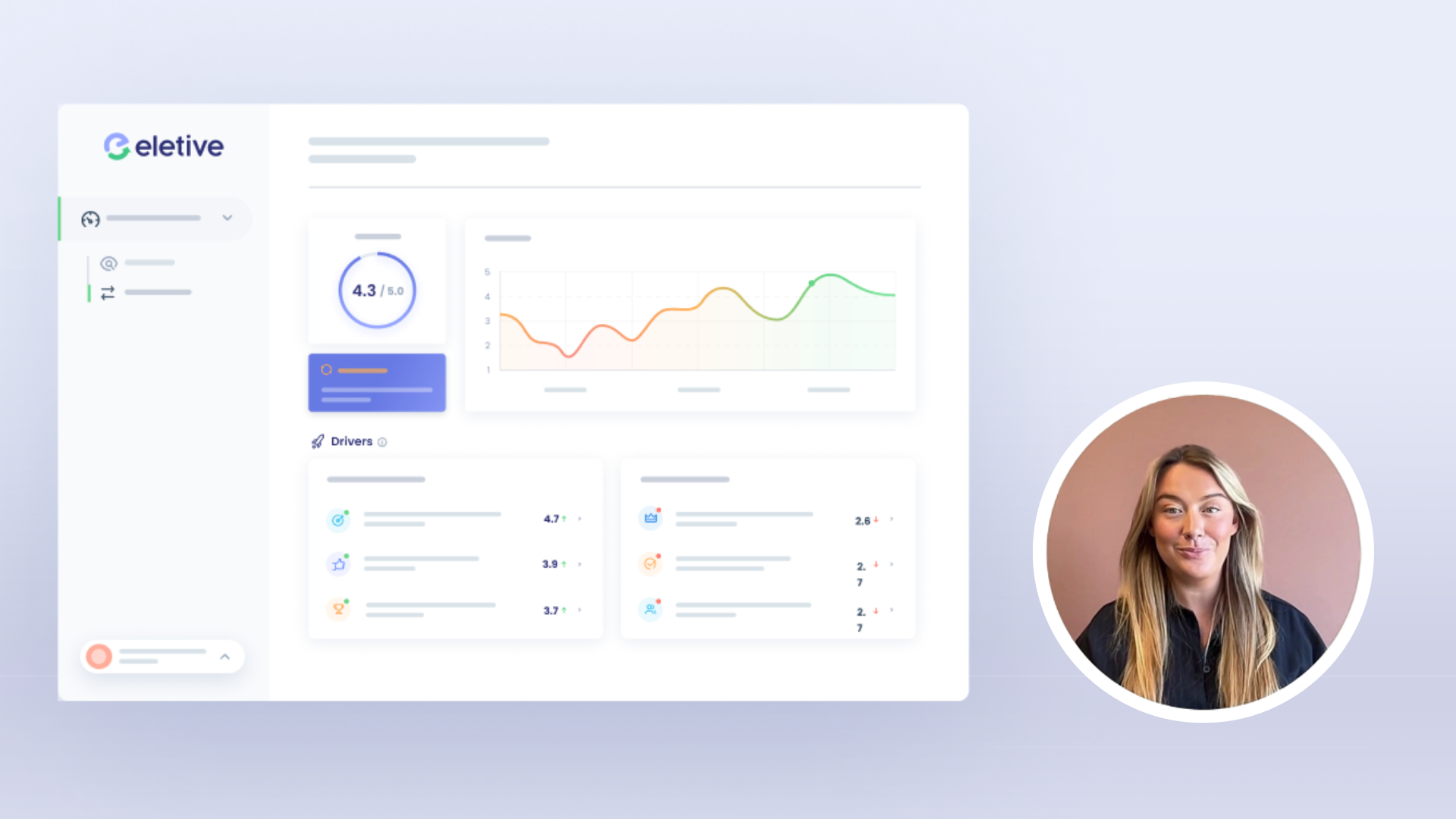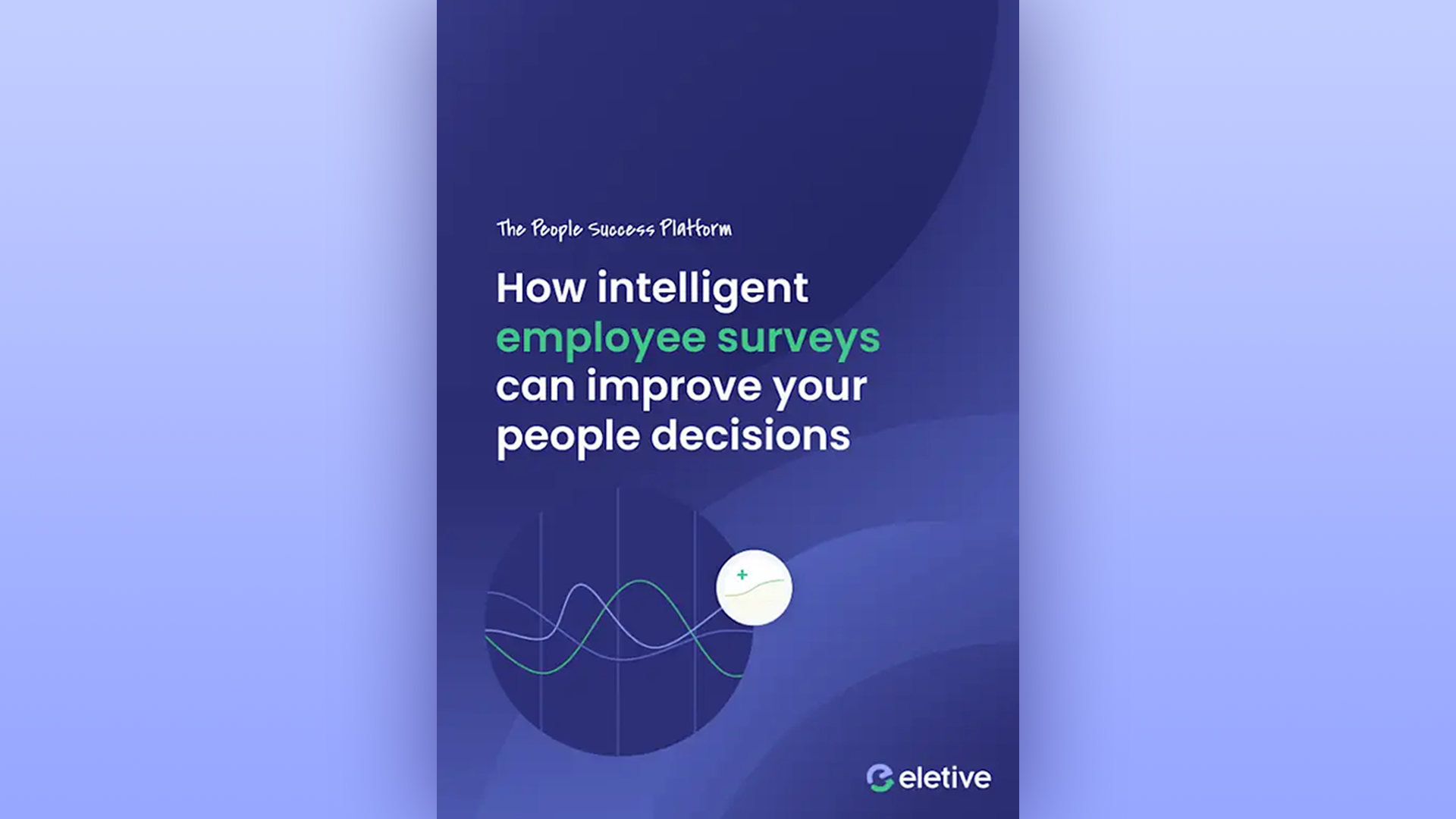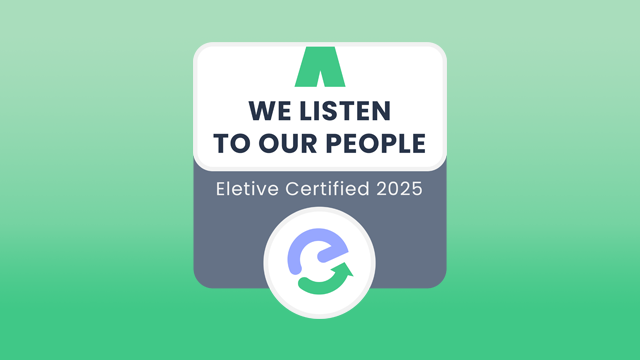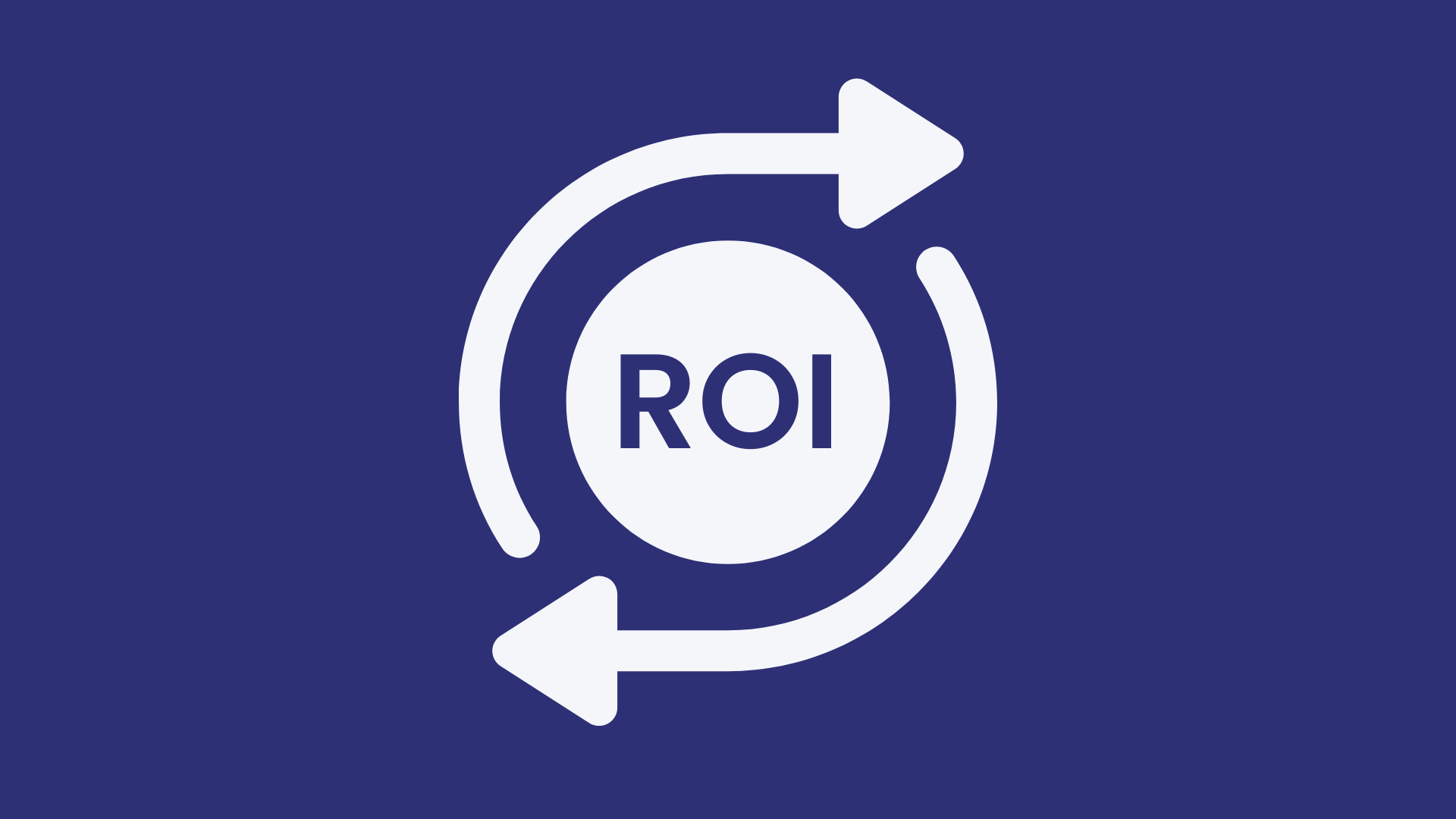Finding the best tools to help employees share feedback and perform better is crucial for any business. So, which is the best employee feedback software out there?
Quick summary
Looking to increase employee engagement and workplace satisfaction in 2026? In this article, we review our 10 best employee feedback software, including Eletive, Lattice, CultureAmp, and OfficeVibe — exploring their key features, benefits, and limitations to help you choose the best fit. Discover how Eletive helps organizations collect, analyze, and act on feedback to improve workplace communication, culture, and performance.
5 best Employee Feedback Software shortlist
We evaluated each tool's key offerings, including ease of collection and scalability, and 5 clearly stood out to us. Here are the top 5 tools we recommend for a range of company sizes and needs:
Eletive — Best for tracking and improving employee engagement and performance
CultureAmp — Best for tracking and analysing culture and employee sentiment
OfficeVibe — Best for collecting feedback from small to mid-sized teams
Qualtrics — Best for conducting enterprise-wide surveys with actionable analytics
TinyPulse — Best for running morale checks with pulse surveys
Go from listening to improving in 2026
Many companies regularly gather employee feedback but struggle to do anything meaningful with it. Insights are limited or nonexistent, and surveys go unanswered when employees view them as a mere formality that makes no real change.
This is where employee feedback software comes in.
With the right tools, leaders can easily capture honest employee sentiments, spot trends early, and turn insights into actionable plans that boost performance, engagement, and initiative.
In this article, we review the top 10 employee feedback tools for 2026. Our selections are based on ease of collection, support for growth, and overall impact on the work environment — we'll help you choose the right fit for your team.
The tools in our lineup are all great options, each with its unique strengths and limitations. Want a quick overview? Watch our five-minute summary below.
Watch Webinar: Increase engagement with Eletive
:format(png)/f/288714721386412/8bc74e1c86/ewebinar__1_.png)
Gather employee feedback with Eletive
Why listen to us?
We offer modern organisations a flexible, intuitive employee engagement platform to boost performance and self-leadership. Powered by our custom technology, Eletive evolves alongside the changing workplace, helping leaders make meaningful, data-led decisions that improve the overall work environment.
For example, when we worked with the leading Austrian telecom provider, Drei, they needed a platform that would enable leaders to listen more frequently and respond faster to employee feedback. After adopting Eletive, they reached an 80% participation rate in their very first survey.
With Eletive, we were able to move from assumptions to data-driven decisions.
Our experience helping leaders build self-starting teams guides our recommendations for the best employee feedback software.
What is Employee Feedback Software?
Employee feedback software provides organisations with digital tools to collect, manage, and analyse employee feedback. Think of it as a digital suggestion box that's always open, but way smarter.
This type of software makes it easy for employees to share their thoughts, ideas, and concerns with their managers and the company. And it's not just about pointing out what's wrong; it's also about celebrating what's right and finding ways to do things better.
Feedback tools for employees include features such as employee surveys, pulse surveys, and chat channels where employees can speak up anonymously if they want. This means everyone gets a voice, not just the loudest people in the room.
But it's not just about collecting feedback. The best part is what comes next. The best employee feedback apps are the ones that help companies understand all the feedback by sorting it, analyzing it, and turning it into action plans.
This way, organisations can use the software to drive real changes that make employees happier and more productive. Employee feedback programs are all about creating a positive loop where feedback leads to action, which leads to improvements, and then more feedback.
Benefits of Employee Feedback Software
Employee feedback systems offer a range of benefits that can transform the workplace into a more open, engaging, and productive environment. Here are some of the key advantages:
Enhanced Communication: These tools break down barriers between staff and management, making it easier for everyone to share their thoughts and ideas directly. This open line of communication fosters a sense of belonging, engages employees, and encourages a more collaborative work culture.
Real-time Feedback: Instead of waiting for annual reviews, employee feedback applications allow organisations to gather employee feedback continuously. This gives managers and employees the chance to address concerns and celebrate successes as they happen. This immediacy helps keep everyone motivated and on track.
Data-driven Insights: Feedback tools enable input from across the organisation, allowing companies to make informed decisions. This data can highlight areas for improvement, track trends over time, and measure the impact of changes.
Increased Employee Engagement: By actively seeking and valuing employee feedback, companies show their workforce that their opinions matter. This recognition can boost morale, increase job satisfaction, and reduce turnover rates.
Transparent Culture: Encouraging open feedback fosters a culture of transparency in which trust can flourish. Employees are more likely to be honest and forthcoming in such an environment, leading to more genuine interactions, a stronger company culture, and better employee experiences.
By leveraging employee feedback survey tools, companies can create a more dynamic, responsive, and engaged workplace equipped to thrive in today's fast-paced business world.
Now, let's have a look at the 10 best software for employee feedback right now!
Comparison: The 10 best Employee Feedback Software for 2026
This table summarizes key details about each employee feedback software on our list to help you make a quick choice. You'll find information on their standout features, pricing, user reviews, and the demographics they are most suited for.
Tool | Best For | Starting Price | Key Strengths | |
Performance analytics for mid-to-large size companies | Custom pricing | AI insights, science-backed surveys, and predictive analytics | ||
Scalable, performance management for companies of all sizes | $11/user/month | Performance reviews, goal tracking, and a user-friendly feedback system | ||
Culture insights & engagement analytics | Custom pricing | Detailed analytics and survey science | ||
Simple feedback for small to mid-sized teams | $5/user/month | Ease of use: great for team morale | ||
Enterprise-level surveys & analytics | Custom pricing | Industry-leading analytics and customisation | ||
All-in-one feedback system for mid-sized organizations | $8/user/month | Goal alignment, progress tracking, and performance rewards | ||
Large-scale employee feedback | $20,000/year | Real-time sentiment tracking and intuitive analytics | ||
Pulse surveys and morale checks | $5/user/month | Timely, lightweight pulse surveys and peer recognition | ||
Flexible surveys for any organization size | $25/user/month | Easy collections and company growth support | ||
Culture benchmarking & certification | Custom pricing (high-end) | Global certification and benchmarking |
1. Eletive
:format(png)/f/288714721386412/1200x569/b14e15689f/eletive-comparison.png)
Eletive stands out in the employee feedback software landscape with a unique approach to employee engagement. With cutting-edge technology and intuitive design, Eletive redefines how companies engage with their employees.
Eletive is a People Success Platform catering to the needs of modern organisations looking to:
Increase employee engagement
Improve the employee experience
Make data-driven people decisions
Create a culture of feedback, self-leadership, and high performance
Eletive helps companies in all industries get a deeper understanding of their workplace dynamics, identify areas for development, and implement targeted strategies to enhance employee satisfaction.
Key Features
Real-time pulse surveys
Survey intelligence
Intuitive heatmaps and dashboards
Attrition prediction
Science-based survey templates and customisable surveys
360-degree feedback
AI-enhanced analytics
Sentiment analysis
Support for large and complex organisations
+43 languages
Pros
Real-Time Engagement Tracking: Pulse surveys to monitor engagement across the organization, ensuring immediate awareness of what's working and what isn't.
Science-Based Question Batteries: Scientifically validated question sets to accurately measure engagement and identify improvement areas.
Customizable Surveys: Flexibility to tailor surveys to specific organizational needs, ensuring relevant and impactful feedback collection.
Data-Driven Decisions: AI, machine learning, and smart surveys for deep, actionable insights.
Efficient Reporting: Provides instant access to real-time data via user-friendly dashboards, heatmaps, and reports, minimizing reporting time and maximizing execution focus.
Comprehensive Performance Management: Facilitates goal alignment and progress tracking, enhancing performance across the board. Supports setting and tracking of SMART goals and OKRs.
Actionable Planning: Enables the creation of detailed action plans at various organizational levels based on survey results, ensuring targeted improvement efforts.
Leadership Development: Provides tools and processes for effective 1:1s and 360-degree feedback to foster managerial growth.
Cultivating Self-Leadership: Promotes a culture where employees are encouraged to take ownership of their experience, supported by GDPR-compliant personal dashboards.
Collaborative Culture Building: Equips managers and employees with the tools to co-create a positive company culture, enhancing overall engagement and satisfaction.
OBM-Inspired Guidance: Offers advice and insights based on Organisational Behavior Management research, empowering employees with the knowledge to improve their work environment.
:format(png)/f/288714721386412/0572bb7471/eletive-scientific-foundation-cover.png)
Eletive Scientific Foundation
Eletive Customer Reviews on G2.com
Sara Ekvall, Director People & Culture:
"Great tool encouraging self-leadership. I like that the employee can see their own results and get tips on how to improve their own work situation. It takes some of the load off HR and management and encourages self-leadership."
Mikaela Schönström, Head of People:
"Eletive is a fantastic engagement tool! Eletive is a great platform, easy to use and understand, which is key to getting a high response frequency and buy-in from the organization. I also appreciate that their question battery is based on scientific research into what drives engagement. They also have a great customer success and support team that makes the journey enjoyable! One more big plus is their integration with Slack. I get notifications through Slack and can also reach the survey from the notification."
2. Lattice
:format(png)/f/288714721386412/2806x1290/93a4bcb4f1/lattica.png)
Lattice is a sophisticated employee performance management software. Its platform is designed for employee feedback and is aimed at organizations looking to foster growth, engagement, and a strong feedback culture.
Pros
Comprehensive Management: Integrates performance reviews, feedback, and goal setting.
User-Friendly Interface: Known for its clean, intuitive design.
Rich Analytics: Provides detailed insights for informed decision-making.
Cons
Initial Learning Curve: New users may need time to fully explore its capabilities.
Cost: Can be expensive, particularly for smaller businesses.
Feature Richness: Its extensive features may be more than some teams need.
3. CultureAmp
:format(png)/f/288714721386412/2850x1284/0ac17c798c/culture-amp.png)
Culture Amp is a leading platform for employee feedback and culture, ideal for organizations committed to understanding and enhancing employee engagement through employee surveys and analytics.
Pros
Deep Insights: Specializes in detailed analysis of feedback.
Customizable Surveys: Offers highly flexible survey options.
Employee Development: Supports growth with feedback-driven insights.
Cons
Customization Complexity: Tailoring customized surveys can be intricate.
Pricing Clarity: Direct inquiry needed for specific pricing.
Data Richness: The extensive data provided may overwhelm some users.
4. OfficeVibe
:format(png)/f/288714721386412/2828x998/e434658690/workleap.png)
Officevibe, part of Workleap, is a user-friendly employee feedback tool ideal for small to medium-sized businesses focused on improving team morale and culture through easy-to-use surveys and feedback mechanisms.
Pros
Simplicity: Straightforward interface for easy feedback collection.
Insightful: Offers clear insights into employee engagement.
Immediate Feedback: Enables quick responses to employee concerns.
Cons
Customization Limits: Fewer options for tailoring surveys.
Basic Analytics: Helpful but not very detailed.
Best for Small Teams: May not fully meet the needs of larger organizations.
5. Qualtrics
:format(png)/f/288714721386412/2724x1292/aaeac004d8/qualtrics.png)
Qualtrics is a sophisticated experience management platform that excels at collecting and analyzing employee feedback to provide deep insights into workplace dynamics and employee engagement.
Pros
Advanced Analytics: Offers comprehensive data analysis tools.
Customizable: Extensive options for survey customization.
Scalable: Suitable for both small businesses and large enterprises.
Cons
Complexity: Might be challenging for new users to navigate.
Cost: Can be expensive, especially for smaller organizations.
Overwhelming Features: The breadth of features can be daunting for those seeking simpler solutions.
6. Leapsome
:format(png)/f/288714721386412/2782x1236/5e62e2da80/leapsome.png)
Leapsome is a versatile platform for performance management and employee feedback, designed for companies of all sizes looking to foster personal growth and organizational development.
Pros
Integrated Tools: Combines performance reviews, goal tracking, and feedback.
User-Friendly: Intuitive interface for easy operation.
Customizable Feedback: Offers flexible survey and feedback options.
Cons
Adaptation Time: It requires a period of adjustment to fully utilize all features.
Pricing: Pricing may be a hurdle for very small businesses.
Feature Richness: Some smaller teams might not need all available functionalities.
7. Workday Peakon Employee Voice
:format(png)/f/288714721386412/2860x1068/378628fa2f/workday-peakon.png)
Workday Peakon Employee Voice is a real-time employee feedback platform that provides businesses with deep insights into employee sentiment and engagement, tailored for companies seeking to actively listen to and respond to their workforce.
Pros
Real-time Feedback: Enables continuous listening through real-time employee feedback surveys.
Intuitive Analytics: Provides easy-to-understand insights for action planning.
Seamless Integration: Integrates with the broader Workday ecosystem.
Cons
Learning Curve: May require some initial learning to navigate effectively.
Cost Considerations: Pricing might be high for smaller organizations.
Focus on Larger Ecosystem: Best benefits are realized when used within the Workday suite, which might limit standalone appeal.
8. TinyPulse
:format(png)/f/288714721386412/2846x998/cc95e5adc3/tinypulse.png)
TinyPulse is an employee engagement platform that specializes in capturing real-time feedback through pulse surveys, offering organizations a simple yet powerful tool to understand and improve workplace morale and culture.
Pros
Focused Surveys: Utilizes pulse surveys for timely feedback.
User Engagement: Offers features such as peer recognition to enhance it.
Actionable Insights: Delivers clear, actionable feedback to foster improvement.
Cons
Narrow Focus: Primarily centered on pulse surveys, with limited options for broader feedback mechanisms.
Learning Curve: Some users might need time to optimize survey effectiveness.
Integration Capabilities: While robust, integration with other HR tools may require additional setup.
9. SurveyMonkey
:format(png)/f/288714721386412/2828x1178/1f012558f0/surveymonkey.png)
SurveyMonkey is a popular tool for creating surveys and collecting employee feedback, known for its flexibility and ease of use. It's suitable for businesses of any size looking to gather insights about how their employees feel, quickly and efficiently.
Pros
Ease of Use: Renowned for its user-friendly interface.
Versatility: Suitable for a wide range of survey types.
Affordability: Offers cost-effective plans for budget-conscious businesses.
Cons
Basic Analytics: The analytics feature lacks depth for complex analysis.
Limited Customization: While flexible, it may not offer the depth of customization needed for specialized feedback collection.
General Focus: Primarily designed for surveys, it may lack specific features for in-depth analysis of employee engagement.
10. Great Place to Work
:format(png)/f/288714721386412/2870x1314/e5dd86c4d9/great-place-to-work.png)
Great Place to Work is an analytics and consulting firm that provides a certification program and employee feedback platform, designed to help organizations build high-trust, high-performance cultures.
Pros
Reputation Boost: Certification can enhance the company's reputation as an employer of choice.
Comprehensive Analysis: Offers deep insights into workplace culture and employee experience.
Benchmarking: Enables comparison against industry standards and best places to work.
Cons
Certification Focus: Primarily geared towards achieving certification, which may not align with all organizations' goals.
Cost: Participation and certification can be costly, especially for smaller businesses.
Complex Process: The process of getting certified and fully utilizing insights can be extensive and time-consuming.
Other Employee Feedback Software to consider
Here are alternative employee feedback software that didn't make it to our top 10 list, but they still offer value, and we think they're worth checking out:
SurveySparrow: For conversational surveys and AI-driven insights
Motivosity: For employee recognition, performance rewards, and retention
15Five: For continuous check-ins and recognition
Reflektive: For real-time conversations at scale and custom analytics
Kazoo: For all-in-one or point-solution employee listening
Perceptyx: For multichannel listening and real-time signals
Energage: For workplace culture insights and talent discovery
Betterworks: For agile employee goal-setting and team alignment
Sogolytics: For automated pulse surveys and an interactive CX dashboard
PerformYard: For AI-enhanced employee performance management and appraisals
Final thoughts: Scale employee engagement with Eletive
Many organisations struggle to choose the ideal employee feedback software for their needs. While collection features are readily available, there's a prominent gap in translating feedback into meaningful actions that impact performance.
The tools we reviewed in this guide address that gap by offering real-time insights, AI-powered analytics, and strategies to boost engagement. They help companies build people-centered cultures and make informed decisions towards employee recognition and talent development.
Eletive is a strong choice for modern organisations seeking to create proactive managers and highly engaged employees. If this aligns with your company's goals, read our blog to find out more about us.
FAQ
Is there free employee feedback software?
Yes, there are free employee feedback tools available. However, they offer limited features compared to paid versions. Tools like Google Forms and certain basic plans of specialised platforms can serve as cost-effective solutions for gathering employee feedback. For more advanced analytics, customization, and support, investing in a paid solution is necessary.
How often should we conduct employee feedback surveys?
The frequency of employee feedback surveys can vary depending on your organization's goals, culture, and the specific issues you're addressing. Most experts recommend conducting comprehensive surveys at least once a year, with more frequent pulse surveys (quarterly or even monthly) to track progress on key initiatives or to gauge employee sentiment more regularly.
Can a feedback platform for employees improve retention rates?
Absolutely. Employee feedback software can play a critical role in improving retention rates by identifying issues and concerns early, fostering a culture of openness and trust, and making employees feel valued and heard. By acting on the feedback collected, companies can address pain points, enhance job satisfaction, and ultimately reduce turnover.



























:format(jpeg)/f/288714721386412/e490991a3d/blog-employee-feedback-software-hero_media.jpg)

:format(jpeg)/f/288714721386412/1280x720/94229f239a/blog-11-best-people-analytics-tools-in-2026.jpg)
:format(png)/f/288714721386412/1200x675/4bf26615f3/virtual-hr-event-people-success-2026.png)
:format(jpeg)/f/288714721386412/1280x720/19af6a1ff1/blog-culture-amp-alternatives-hero.jpg)